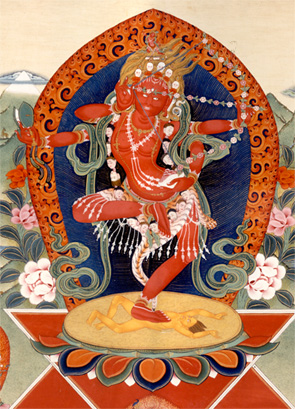Kurukulla: Difference between revisions
Jump to navigation
Jump to search
mNo edit summary |
No edit summary |
||
| Line 1: | Line 1: | ||
[[Image:Kurukulla.jpg|frame|From the visions of [[Jamyang Khyentse Wangpo]]. (Courtesy of [[Dzongsar Jamyang Khyentse Rinpoche]])]] | [[Image:Kurukulla.jpg|frame|From the visions of [[Jamyang Khyentse Wangpo]]. (Courtesy of [[Dzongsar Jamyang Khyentse Rinpoche]])]] | ||
'''Kurukulla''' (Skt. ''kurukullā''; Tib. [[རིག་བྱེད་མ་]], ''rikjéma''; [[Wyl.]] ''rig byed ma'') — a female deity of the [[Lotus family]], associated with the activity of magnetizing. She is usually depicted as red in colour, in dancing posture and holding a flowery bow and arrow. She is also one of the [[Twenty-One Taras]] mentioned in the ancient [[Tara]] [[tantra]]s. | '''Kurukulla''' (Skt. ''kurukullā''; Tib. [[རིག་བྱེད་མ་]], ''rikjéma''; [[Wyl.]] ''rig byed ma'') — a female deity of the [[Lotus family]], associated with the activity of magnetizing. She is usually depicted as red in colour, in dancing posture and holding a flowery bow and arrow. She is also one of the [[Twenty-One Taras]] mentioned in the ancient [[Tara]] [[tantra]]s. | ||
It should be noted that in her well known mantra, it says Kurukulle and not Kurukulla, yet this is because of the vocative form of Sanskrit grammar. The proper noun is thus Kurukulla. | |||
==External Links== | ==External Links== | ||
Revision as of 02:19, 9 March 2017

Kurukulla (Skt. kurukullā; Tib. རིག་བྱེད་མ་, rikjéma; Wyl. rig byed ma) — a female deity of the Lotus family, associated with the activity of magnetizing. She is usually depicted as red in colour, in dancing posture and holding a flowery bow and arrow. She is also one of the Twenty-One Taras mentioned in the ancient Tara tantras.
It should be noted that in her well known mantra, it says Kurukulle and not Kurukulla, yet this is because of the vocative form of Sanskrit grammar. The proper noun is thus Kurukulla.